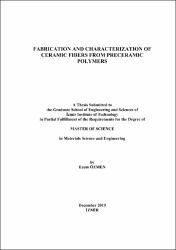Please use this identifier to cite or link to this item:
https://hdl.handle.net/11147/9632Full metadata record
| DC Field | Value | Language |
|---|---|---|
| dc.contributor.advisor | Ahmetoğlu, Çekdar Vakıf | |
| dc.contributor.advisor | Demir, Mustafa Muammer | |
| dc.contributor.author | Özmen, Ecem | - |
| dc.date.accessioned | 2020-08-26T13:32:18Z | |
| dc.date.available | 2020-08-26T13:32:18Z | |
| dc.date.issued | 2019-12 | en_US |
| dc.identifier.citation | Özmen, E. (2019). Fabrication and characterization of ceramic fibers from preceramic polymers. Unpublished master's thesis, İzmir Institute of Technology, İzmir, Turkey | en_US |
| dc.identifier.uri | https://hdl.handle.net/11147/9632 | |
| dc.description | Thesis (Master)--Izmir Institute of Technology, Materials Science and Engineering, Izmir, 2019 | en_US |
| dc.description | Includes bibliographical references (leaves: 36-38) | en_US |
| dc.description | Text in English; Abstract: Turkish and English | en_US |
| dc.description.abstract | Ceramic fibers which are classified as oxide and non-oxide fibers are preferred to use in applications which are carried out at high temperature since they have high strength, low thermal expansion, corrosion, and oxidation resistance. Non-oxide fibers are generally produced using preceramic polymers by the spinning method. The production of ceramic materials using preceramic polymers by spinning method is more advantageous than other methods since the production of complex materials could be achieved at lower temperatures. The preceramic polymer family is basically classified as polysiloxane, polysilazane and polycarbosilane. In this thesis, it was aimed to obtain ceramic fiber in the most economical way. In this context, a spinning device was designed and made. Additionally, polysiloxane which is the most economical preceramic polymer was used to produce ceramic fiber. Polysiloxanes were spun by melt spinning. Obtained fibers were cured by different methods. As a result of pyrolysis, 65-130 μm thickness SiOC fibers were achieved. | en_US |
| dc.description.abstract | Oksit ve oksit olmayan lifler olarak sınıflandırılan seramik liflerin, yüksek dayanıma, düşük ısıl genleşmeye, korozyona ve oksidasyona karşı dirence sahip oldukları için yüksek sıcaklıkta gerçekleştirilen uygulamalarda kullanılması tercih edilir. Oksit olmayan fiberler genellikle eğirme yöntemiyle preseramik polimerler kullanılarak üretilir. Eğirme yöntemi ile preseramik polimerler kullanarak seramik malzeme üretmek diğer yöntemlere kıyasla daha avantajlıdır çünkü karmaşık yapılı malzemeler daha düşük sıcaklıklarda üretilebilir. Preseramik polimer ailesi temel olarak polisiloksan, polisilazan ve polikarbosilan olarak sınıflandırılır. Bu tezde, seramik elyafın en ekonomik şekilde elde edilmesi amaçlandı. Bu bağlamda, bir eğirme cihazı tasarlandı ve yapıldı. Ayrıca; seramik elyafı üretmek için en ekonomik preseramik polimer olan polisiloksanlar kullanıldı. Polisiloksanlar eriyik (melt) eğirme yöntemiyle elde edildi. Fiberler farklı yöntemlerle kürlendi. Piroliz sonucunda 65-130 μm kalınlığında SiOC fiberler elde edildi. | en_US |
| dc.format.extent | xiii, 38 leaves | |
| dc.language.iso | en | en_US |
| dc.publisher | Izmir Institute of Technology | en_US |
| dc.rights | info:eu-repo/semantics/openAccess | en_US |
| dc.subject | Industrial ceramics | en_US |
| dc.subject | Preceramic polymers | en_US |
| dc.subject | Ceramic fiber | en_US |
| dc.title | Fabrication and characterization of ceramic fibers from preceramic polymers | en_US |
| dc.title.alternative | Preseramik polimerden seramik fiberler üretimi ve karakterizasyonu | en_US |
| dc.type | Master Thesis | en_US |
| dc.institutionauthor | Özmen, Ecem | - |
| dc.department | Thesis (Master)--İzmir Institute of Technology, Materials Science and Engineering | en_US |
| dc.relation.publicationcategory | Tez | en_US |
| item.grantfulltext | open | - |
| item.openairecristype | http://purl.org/coar/resource_type/c_18cf | - |
| item.fulltext | With Fulltext | - |
| item.languageiso639-1 | en | - |
| item.openairetype | Master Thesis | - |
| item.cerifentitytype | Publications | - |
| Appears in Collections: | Master Degree / Yüksek Lisans Tezleri | |
Files in This Item:
| File | Description | Size | Format | |
|---|---|---|---|---|
| 10171985.pdf | MasterThesis | 5.09 MB | Adobe PDF |  View/Open |
CORE Recommender
Page view(s)
268
checked on May 27, 2024
Download(s)
326
checked on May 27, 2024
Google ScholarTM
Check
Items in GCRIS Repository are protected by copyright, with all rights reserved, unless otherwise indicated.